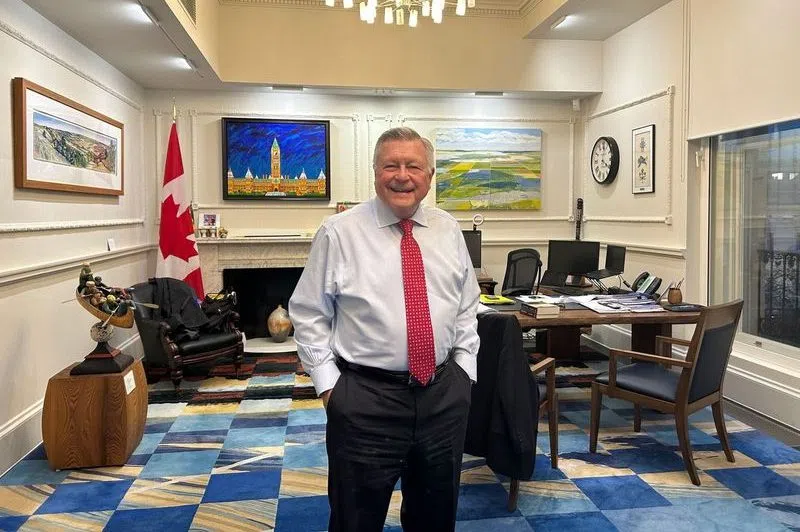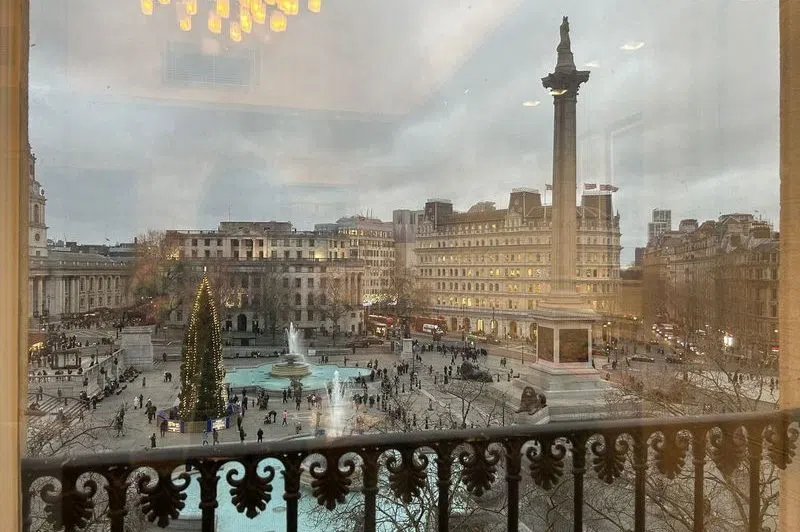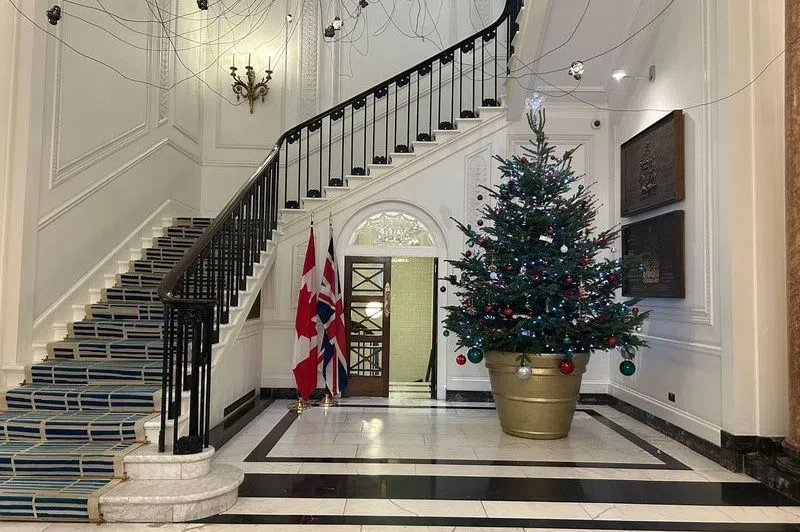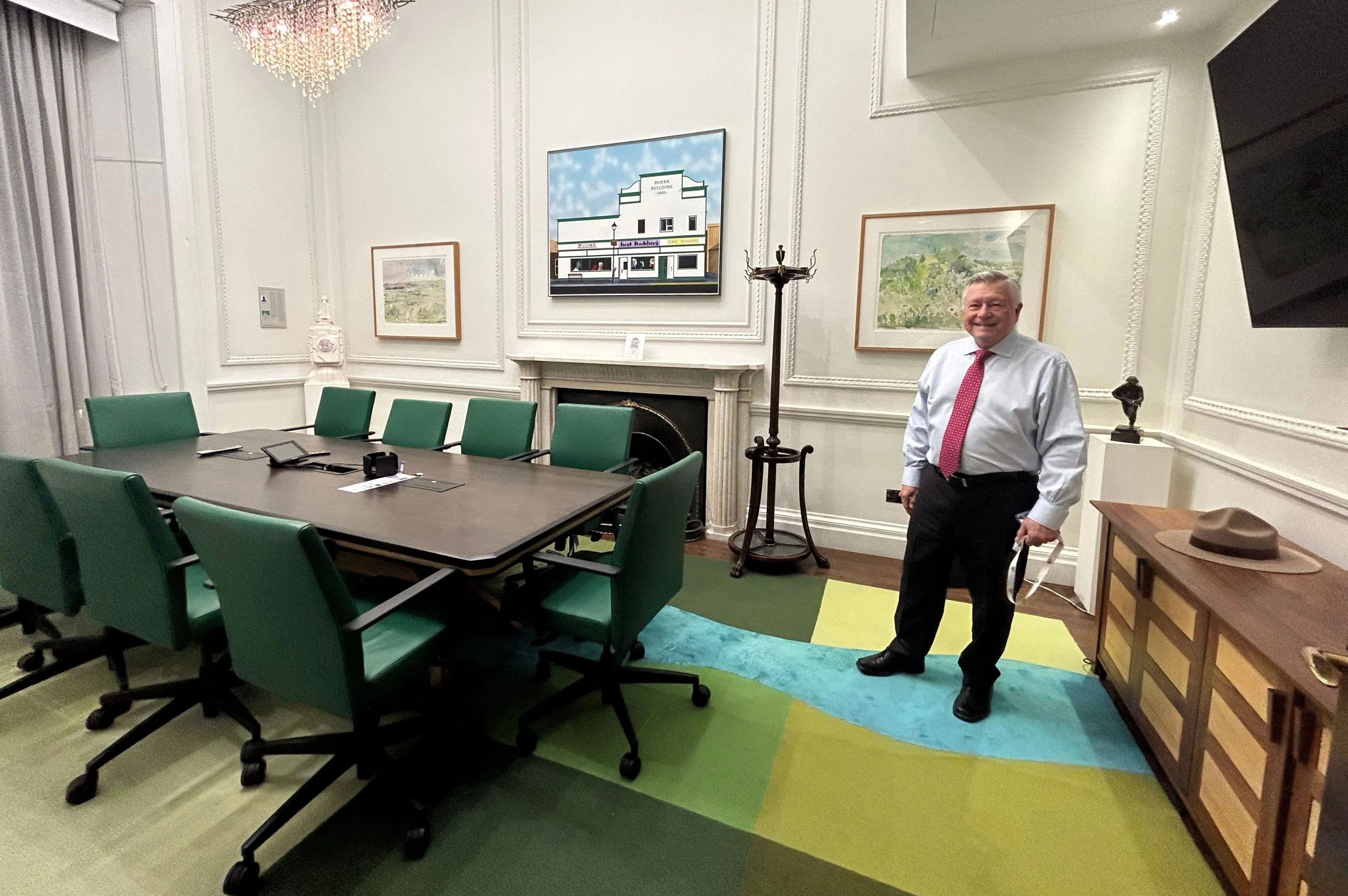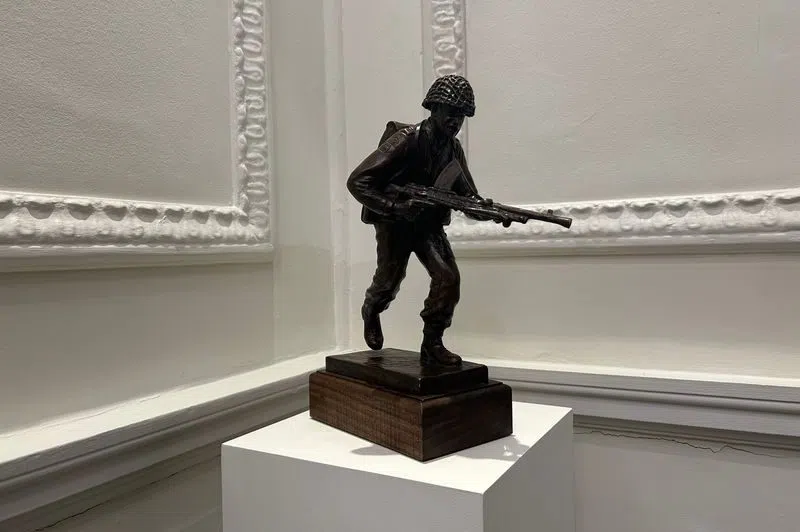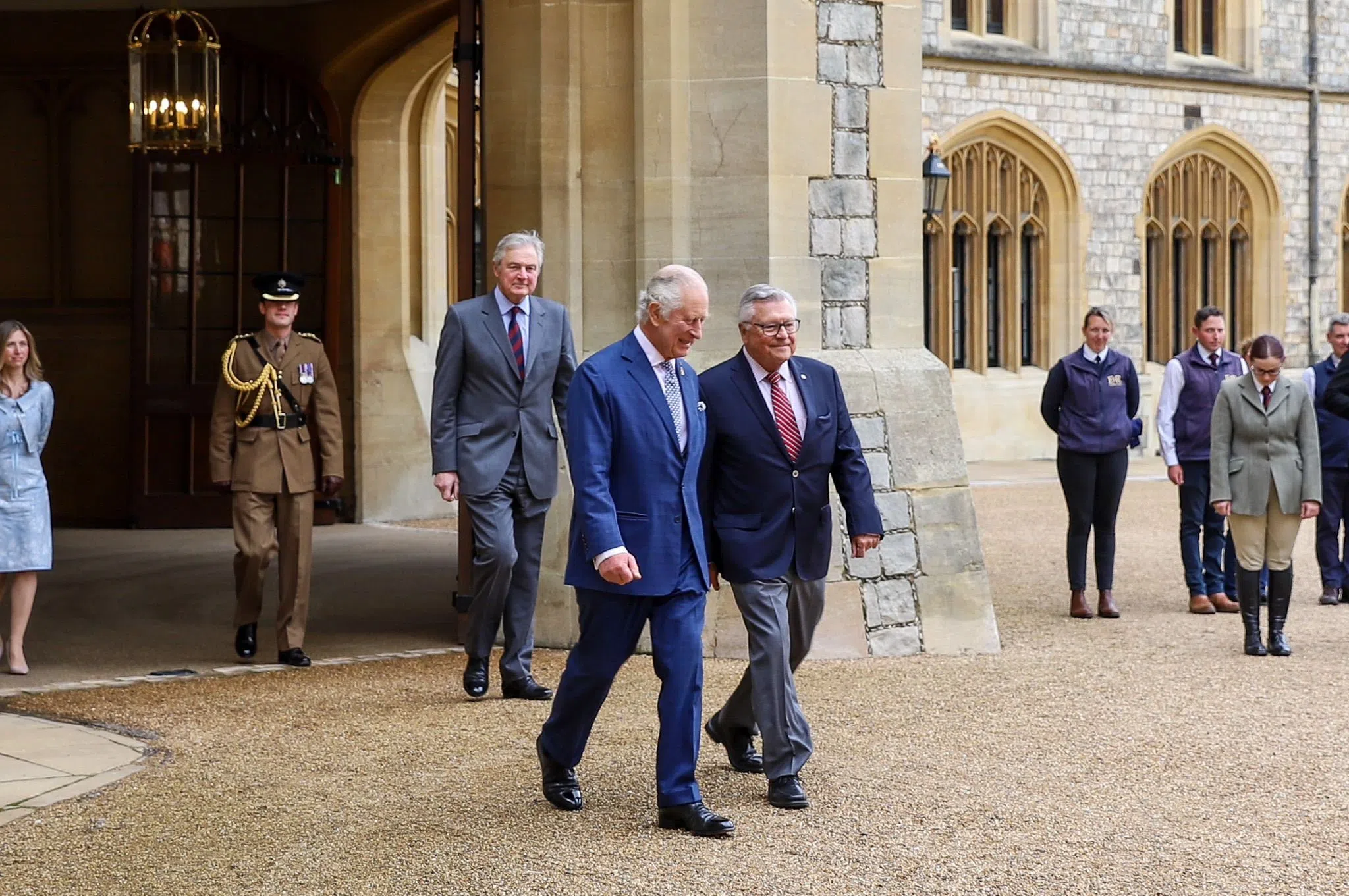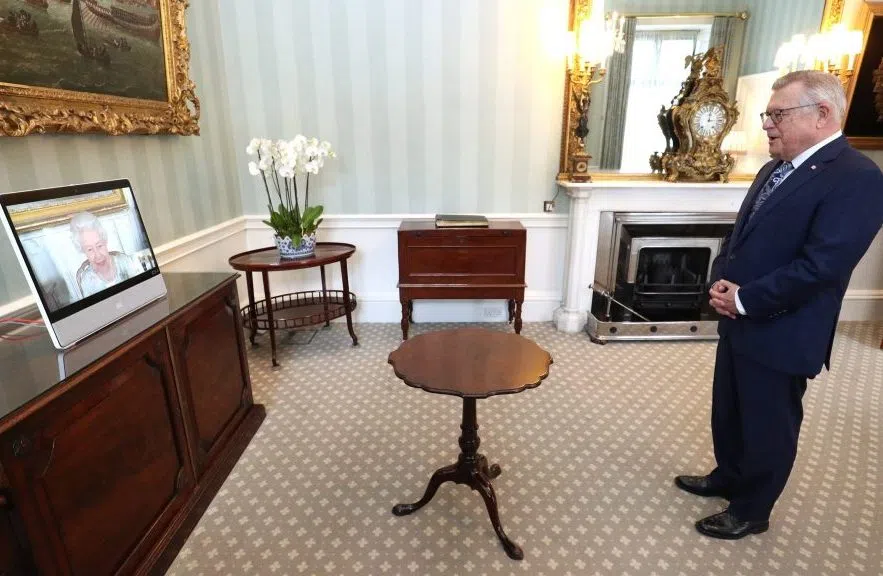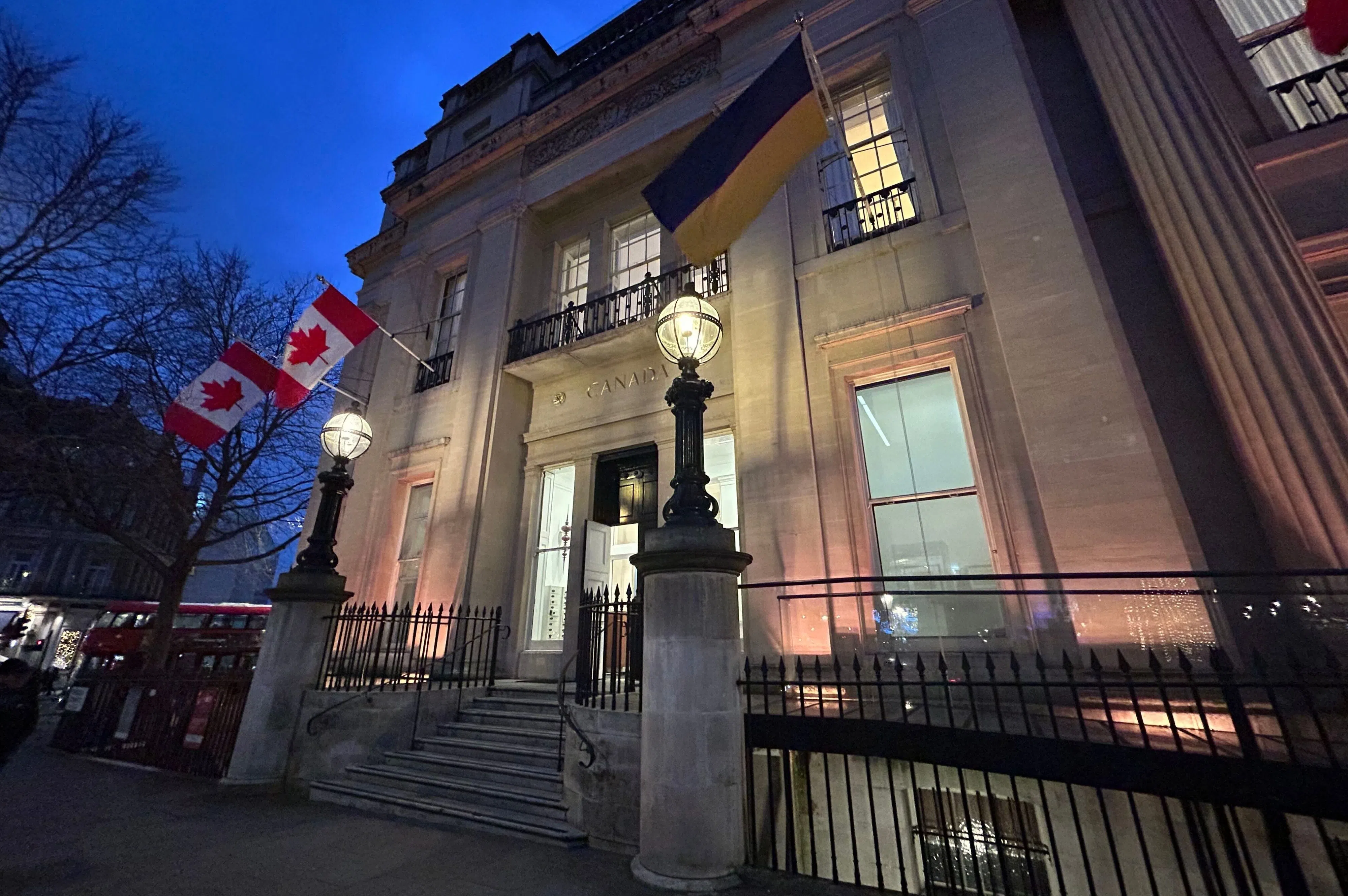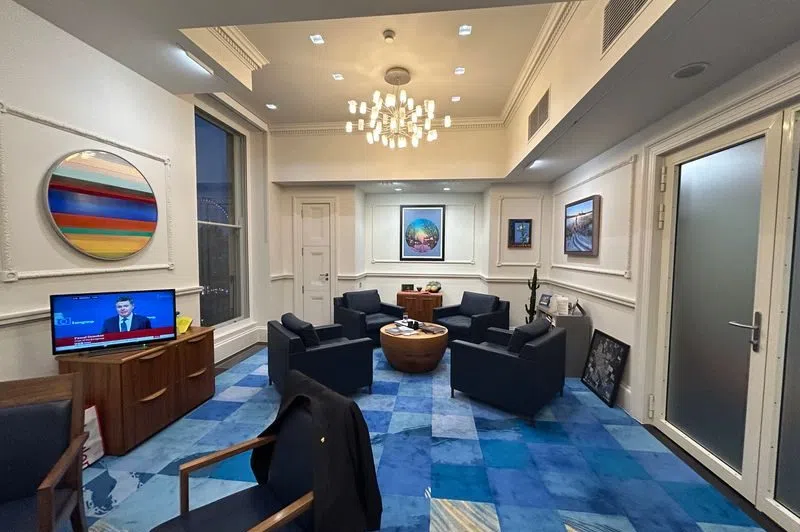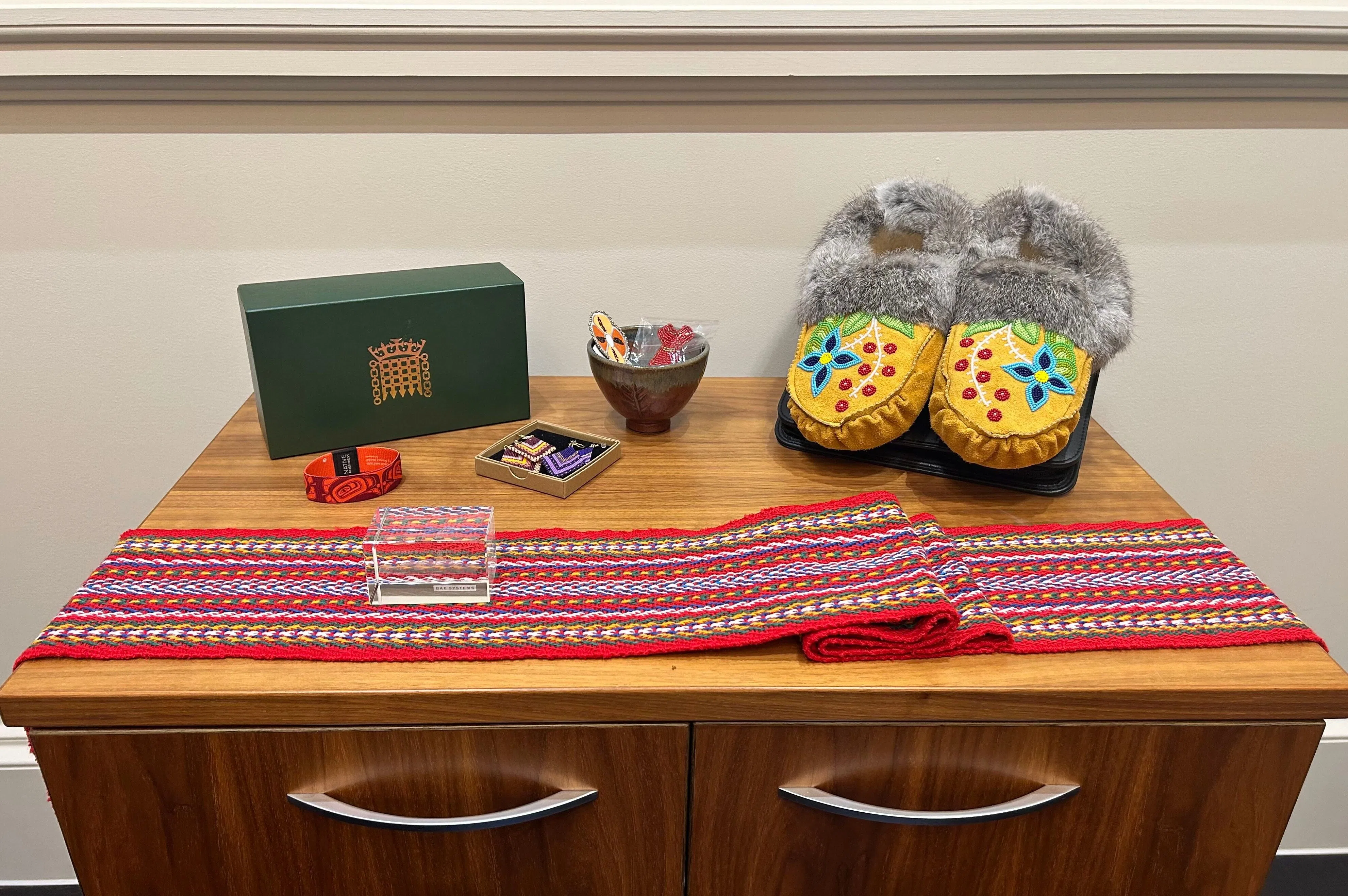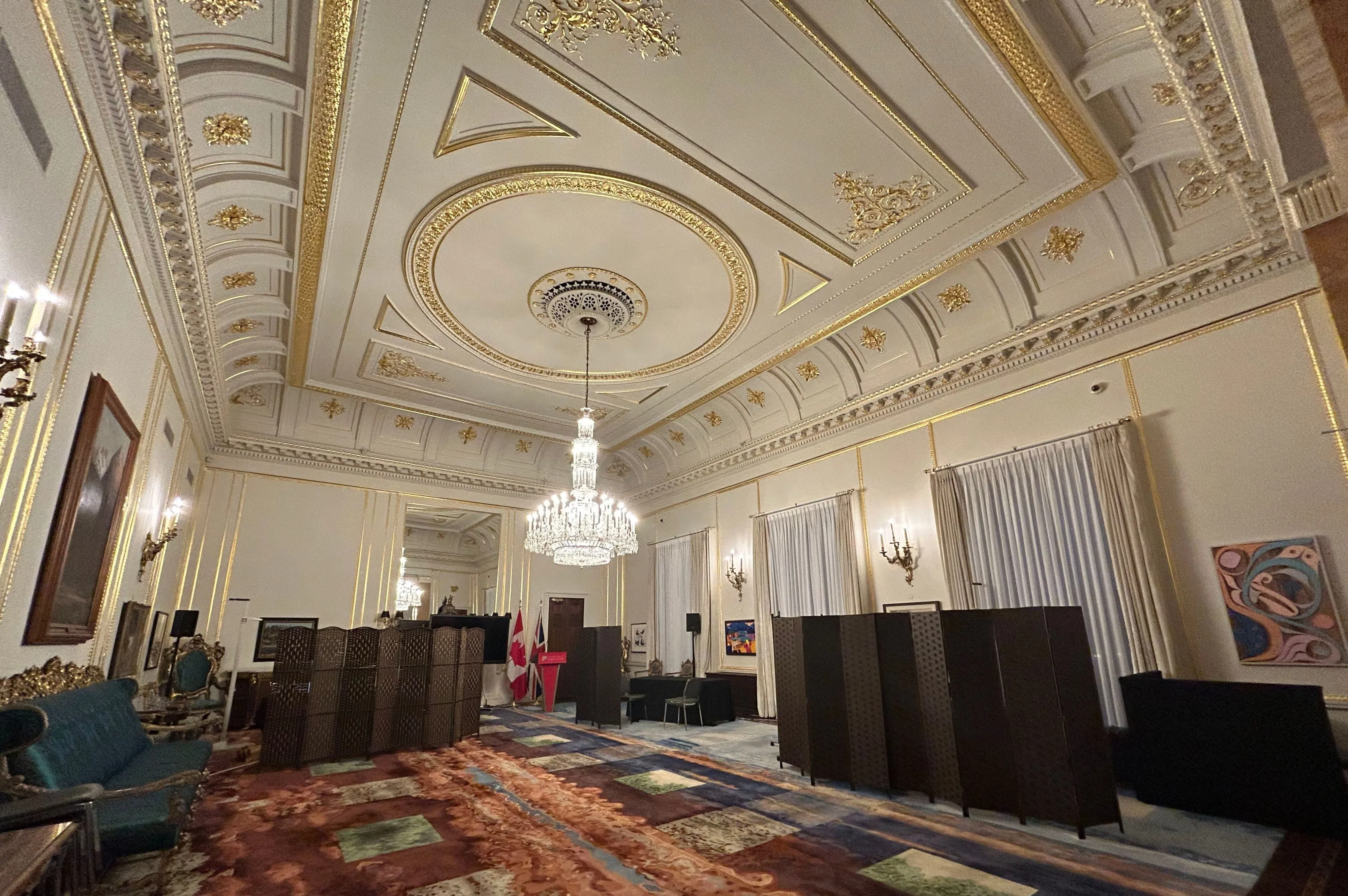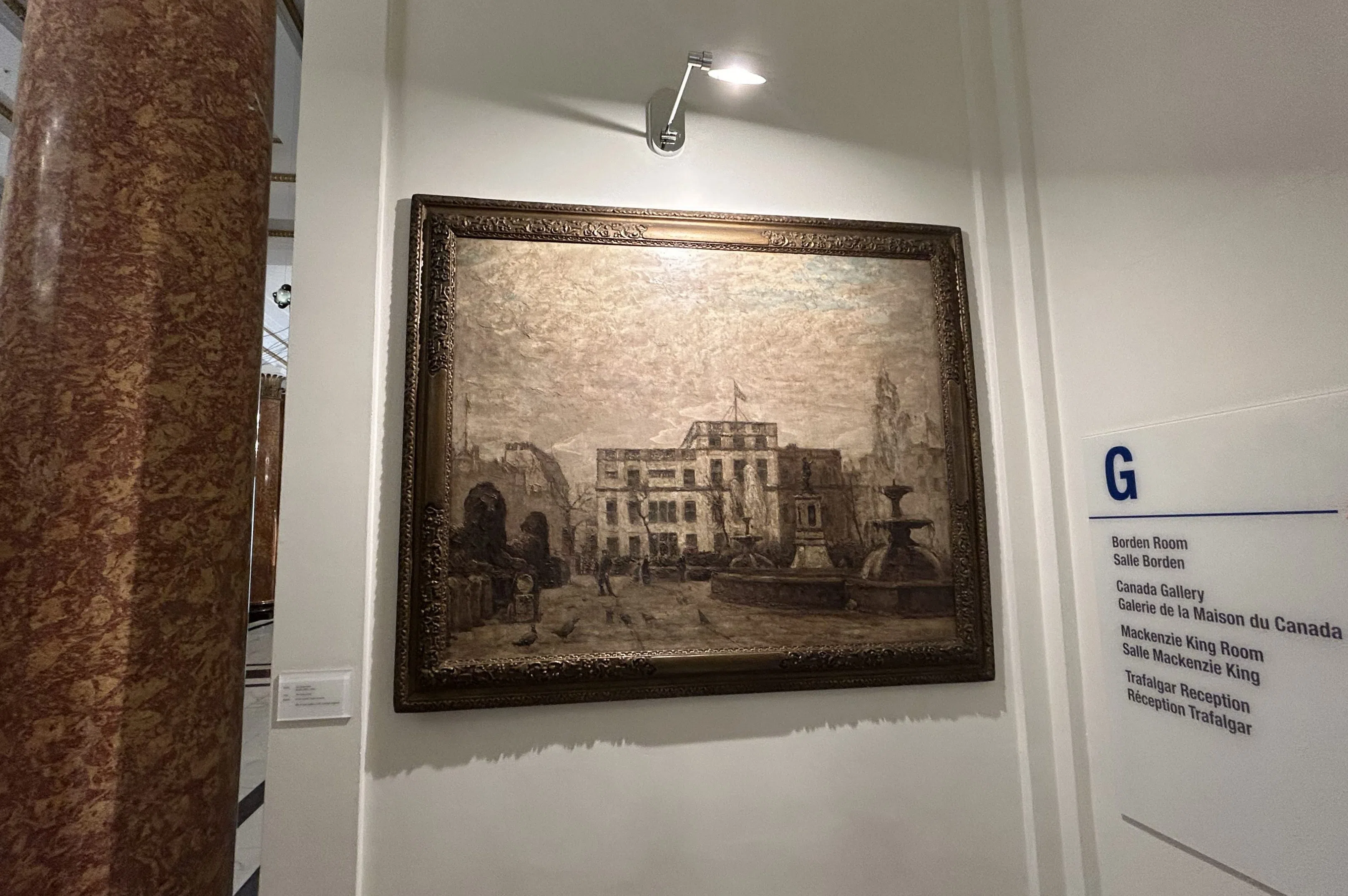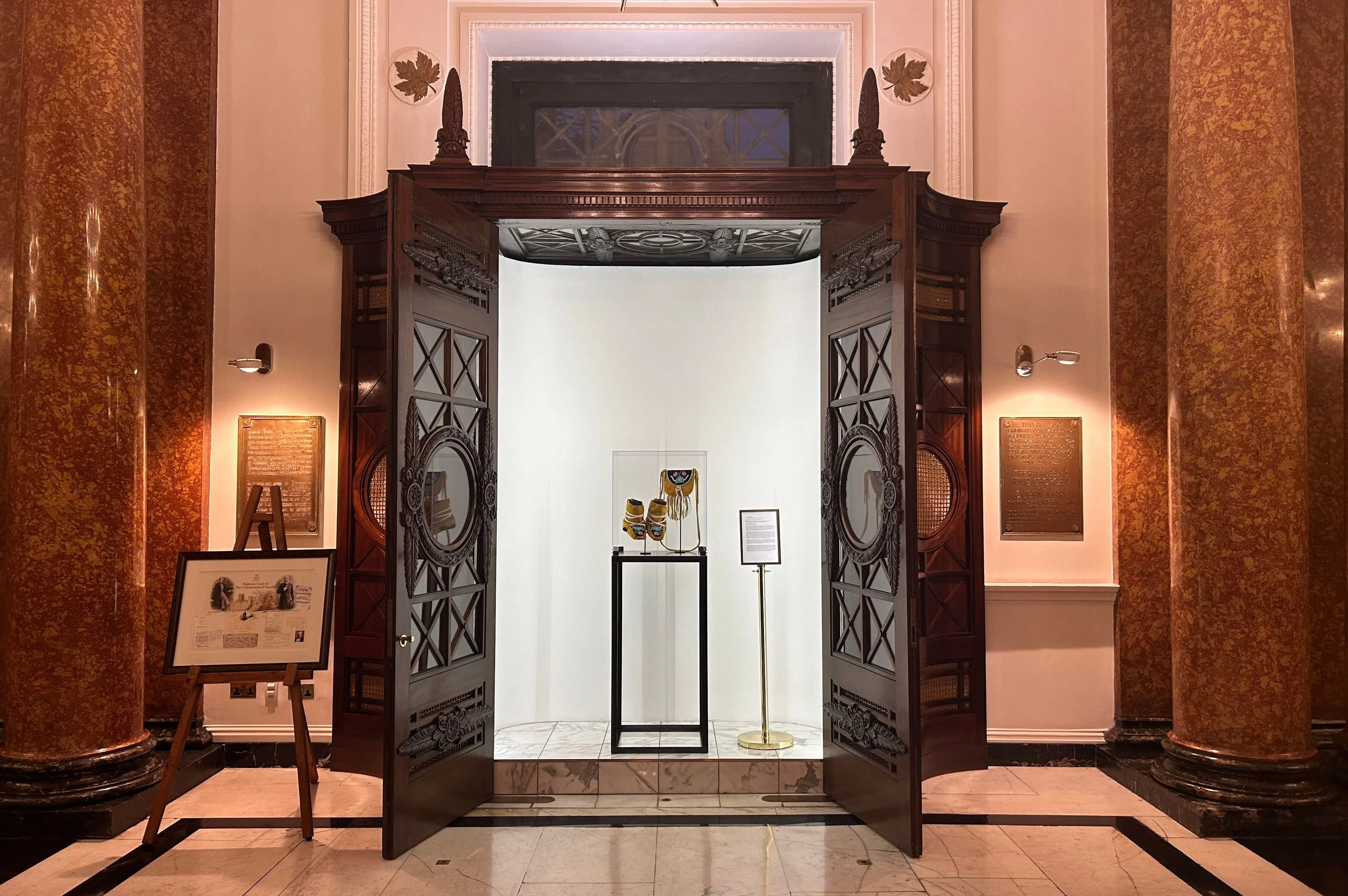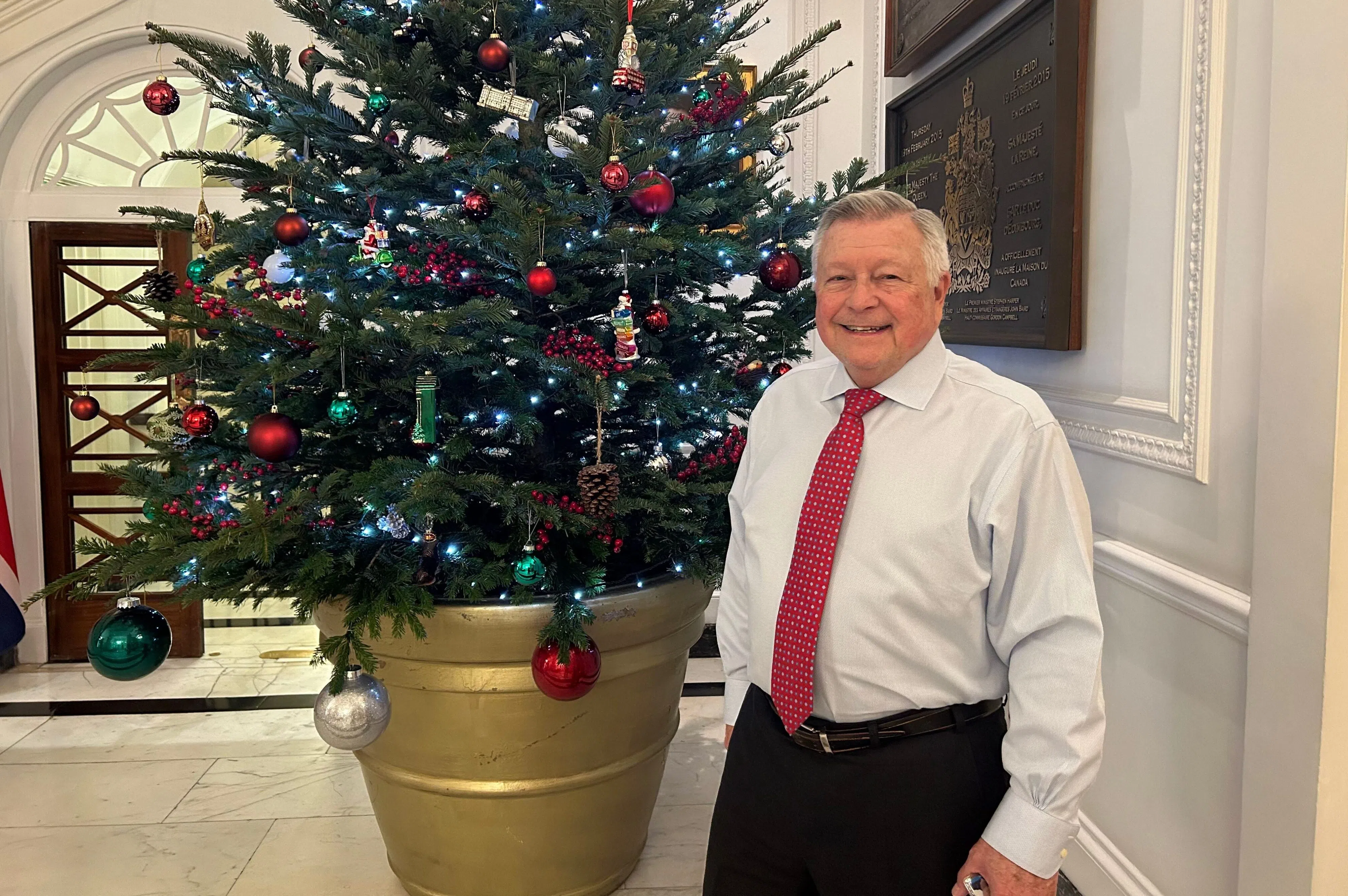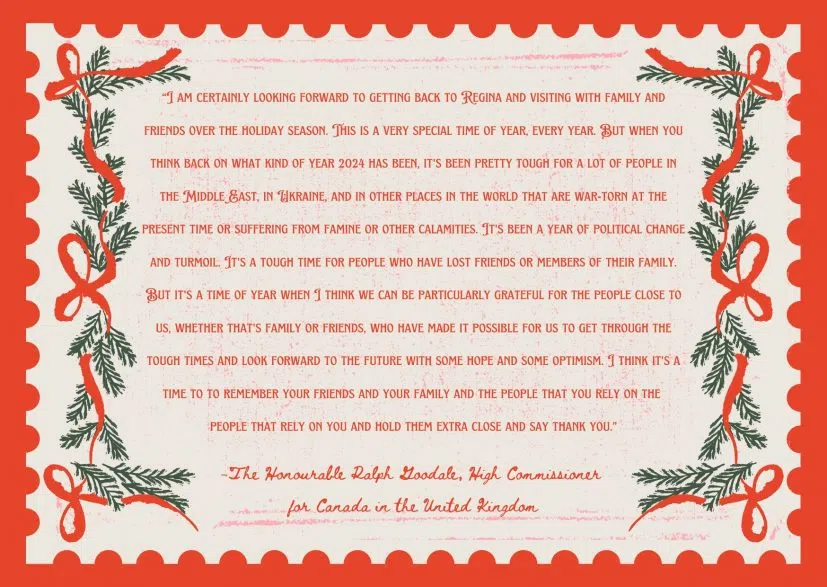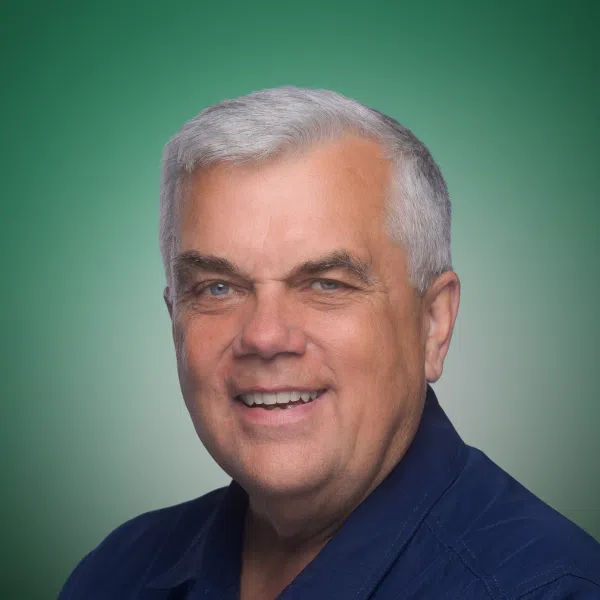LONDON — While most Saskatchewan citizens gaze out at snowbanks in the weeks leading up to Christmas, Ralph Goodale enjoys one of the most iconic views in London: Trafalgar Square.
From the windows of Canada House, he has a front-row seat to the heart of British history and culture. As Canada’s High Commissioner to the United Kingdom, a role he has held since 2021, Goodale has a unique vantage point on both the vibrant city of London and the global stage where Canadian interests are championed. Goodale was Saskatchewan’s only liberal MP serving the Regina—Wascana riding for 22 years.
The windows in Goodale’s office offer a remarkable view of one of the most iconic spots in London — Trafalgar Square. (Brittany Caffet/650 CKOM)
During a recent visit to London, 650 CKOM’s Brittany Caffet not only sat down with Goodale to discuss the work of a high commissioner, his experiences with the royal family and the contrasts between life in the UK and his home province, but also got an exclusive inside look at Canada House itself.
With Christmas approaching, Goodale reflected on the challenges of 2024 and shared a heartfelt message for those back home in Saskatchewan.
_____________________________________________________________
Brittany Caffet: What does a high commissioner do?
Ralph Goodale: High commissioner is a rather unique international diplomatic word. It means exactly the same thing as ambassador. Part of it is representational — to be out and about. But your first job is to make sure that the Government of Canada is represented at every event and in every conversation in the United Kingdom where Canada has an interest.
We have a team here that adds up to a very close to 300 people. It’s the second largest Canadian mission abroad, the biggest is obviously in Washington. And that team navigates a variety of affairs including political or diplomatic matters, national defense and security matters, trade and commerce or cultural events. It could also be consular affairs where Canadians are traveling abroad and they run into some difficulty. They lose their passport or they get into a traffic accident or something. They need support or assistance. Wherever there is a Canadian interest, we are here in the UK to promote and protect and defend that interest.
So as a high commissioner you go to a lot of meetings, you listen to a lot of conversations, you make every argument in favour of Canada’s position that you can possibly think of, just to make sure that Canadians are fully and robustly represented where their interests are affected in the U.K.
The grand staircase in Canada House is original to the building. With no visible support beams, it is one of the worlds first floating staircases in the world. Its said that when the building first opened, many visitors were afraid to climb the stairs for fear they might fall. (Brittany Caffet/650 CKOM)
As high commissioner, what does your daily routine look like?
Well, you never know quite what’s going to come up on any particular day. And in this last number of years that I’ve been here, the agenda has been quite unpredictable. We had a war that started in Ukraine, another war that started in the Middle East. You can’t really work those things into your agenda in an orderly way. You just deal with what comes up as it comes up day-by-day. It’s a job that is unpredictable from day-to-day. I mean, some days on the social calendar there will be a dinner at Mansion House or there will be a reception at Guild Hall or there’s some kind of formal event taking place at Buckingham Palace or St. James Palace and the royal family will either be there or not there. Every day has some unique twist to it.
Canada House features sixteen rooms named for Canada’s provinces, territories and oceans. The chairs in the Saskatchewan Room are a bright shade of emerald. “Rider green!” Goodale explained with a smile. (Brittany Caffet/650 CKOM)
What’s the coolest event you’ve gone to?
Oh my goodness, there have been so many of them. I think though the ones that would really stand out would be those from this past summer associated with the 80th anniversary of D-Day. That was such an important moment in Canadian history, in world history. And Canadians played a very decisive role on that day, June 6, 1944. So this past summer, a group of both soldiers and veterans from the Royal Regina Rifles organized an event that would take place the day before D-Day in Bradfield where this monument to the Royal Regina Rifles would be unveiled. And their honorary colonel just happens to be Her Royal Highness, the Princess Royal, Princess Anne. They asked her if she would officiate at the unveiling of this memorial. It was a pretty emotional moment and it was one of those occasions that I don’t think you’ll ever forget for Canadians generally, and especially if you come from Saskatchewan.
A replica of the statue that was placed on the Normandy beach where the Regina Rifles Regiment landed on June 6, 1944, sits proudly in the corner of the Saskatchewan Room. (Brittany Caffet/650 CKOM)
You mentioned Princess Anne. How many members of the Royal Family have you spent time with?
Oh goodness, quite a few at various formal events. One of my first calls when I arrived here was from Prince Charles, as he then was, and he noted that he had been in Saskatchewan on several occasions as the Prince of Wales and that he and I had attended a number of events together particularly one occasion when we flew on a helicopter down to the Grasslands National Park because he wanted to see that part of Saskatchewan. And he was just so very warm and down to earth and receptive and inclusive. There was nothing pretentious about him.
I’ve had a number of visits with Princess Anne, largely because of her Commonwealth connections and her military connections, many of which have interrelationships with Saskatchewan. And Prince William and Princess Kate have been at a great many official functions that I have attended and I’ve had the chance to visit with them. But in every case, members of the Royal Family work very hard at connecting with countries in the Commonwealth, especially, and there’s obviously a particular bond with Canada, and that, I guess, follows from their mother’s example.
Ralph Goodale, Canada’s High Commissioner to the United Kingdom, with King Charles III. (Ralph Goodale/Twitter)
Were you able to meet Queen Elizabeth II?
Yes, here at the very beginning of my tenure in London, the Commonwealth Games were held in Birmingham, and I had the occasion to meet Her Majesty there. I had my audience with her within a couple of months of arriving here in 2021. But that was during COVID, so she was at Windsor Castle, and I was at Buckingham Palace, and we were doing it virtually. But she was amazing at the way she used technology, you would have had the feeling that she’s just sitting in that chair, you know, right across the room, rather than 40 or 50 miles away and linked up by technology. But a very, very special person and one that had enormous affection for Canada and I think Canadians reciprocated that.
Ralph Goodale, Canada’s High Commissioner to the United Kingdom, is seen speaking with the late Queen Elizabeth II virtually. (Ralph Goodale/Twitter)
You’ve been in politics for a long time. Even with that extensive experience, did you feel intimidated coming into this role?
The political life was a good education. There’s a lot of background information you pick up, understanding about how the systems work, and so forth. So in that regard, I had the chance through my political activity to get prepared for this role, but it’s a different role. As a minister in the federal cabinet, you’re making decisions every day. In this role, you’re providing input into the decision-making process to make sure on a foreign policy matter, for example, that decision makers in Ottawa are fully aware of all the nuances involved in the British position on that particular topic. Will they react favorably or unfavorably? Do they have questions? Is there an issue in the context or the background that would be useful for Ottawa to be aware of? And London is an international location so that you’re not just listening for input from the Brits. That’s always helpful, but input from everybody else, because everybody else is here. They are coming and going, whether it’s on diplomacy or economics or politics or culture. The whole world passes through London all the time. So there’s a lot of global information that you feed into the system. It’s a little intimidating, but you just have to keep your eye on the ball and remember whose team you’re playing for. It’s very interesting, very easy in this global context in London to maybe lose sight of who’s on what team. You just have to remind yourself all the time, we’re playing for Canada, you know. That’s the interest that matters, number one, all the time. And you look for every opportunity you can get to make sure that the Canadian point of view is vigorously put forward.
Read more:
- Former Sask. MP Ralph Goodale appointed as Canada’s high commissioner in the U.K.
- Christmas cheer spread by Sask. dancers singing Ukrainian carols
- Santa won’t respond to letters, but he will get them: Canada Post
Do you get nervous about the etiquette and protocol surrounding these fancy events with important people?
Yeah, it’s a little bit formidable. All of the costumes and the uniforms and the braid and the medals and the feathers and the ribbons… it’s quite an experience! But there’ll always be somebody who will helpfully say, “You should stand over there, or step back please, or step forward please, or not here and not now.” There’s nobody that does ceremony and protocol quite as much or quite as well as the British. You just look at all of those knives and forks and remember the basic rule that you work from the outside in. And don’t start with the fork that’s closest to your plate!
Do you still have moments when you think to yourself, ‘I cannot believe I get to do this.’
Oh yeah. You know, it’s a great privilege having this role and it’s one that only a very few people in the history of Canada have been able to perform. We’ve had a high commissioner in London since 1880 and in that space of time there have been only a couple dozen that have filled that role so it’s a really unique privilege and I don’t think there’s a day goes by that I don’t count myself very fortunate to have this opportunity.
Canada House, located on Trafalgar Square in Central London, has been Canada’s diplomatic home since 1925. (Brittany Caffet/650 CKOM)
So, we’ve covered off work. What do you do when you have a day off?
Walking. London is an incredibly fascinating city just to walk around. The thing you have to remember is don’t walk in a straight line because then you have to walk back. Walk in a circle. And you’ll save yourself some traffic at the end of the day. But there’s history and culture and something fascinating or completely outrageous on every street corner. You could walk around the city of London for quite literally years and not cover it all. There is just so much history that’s rooted around this city, or culture, or entertainment, or the whole political center of London, Westminster, the Houses of Parliament, the House of Lords, Buckingham Palace… taking those walks around London is just a fascinating thing to do, enjoyable, probably good exercise, but at the same time it’s a real learning experience. So I do a lot of that.
One thing the Prime Minister told me when I took the job was, “Make sure you get out of London. You are not the Canadian High Commissioner to London, you are the Canadian High Commissioner to the United Kingdom.” So I’ve had the opportunity to travel to a large number of communities across England and into Scotland and Wales and Northern Ireland. I went to the little town of Bolton north of Manchester where there’s a bakery that has been importing Saskatchewan wheat since the 1920s. Warburtons is the name of the company and they’ve been one of the biggest customers for the highest quality Saskatchewan wheat since almost World War I. They’ve been a great partner. So I wanted to see that bakery that’s been producing all of this bread. And on and on it goes, getting into all of the nooks and crannies of Canadian interests here.
Goodale’s pride in his Saskatchewan roots is showcased through the art on display in his office. The walls are adorned by numerous paintings from Saskatchewan artists. (Brittany Caffet/650 CKOM)
You said you love walking around London. In your role, do you just get to go out on the street like any Joe Blow, or are there security guards in black suits following you around?
Not that I know of. I haven’t seen them. If they’re there, they’re very good! You know, if there is something happening that raises a security risk, then we take appropriate steps to deal with that. But It’s something that happens only very, very rarely. I’m able to walk about London in a very normal way. As big cosmopolitan international cities go, it’s a safe venue. And that’s another thing that’s very fortunate about this assignment. There are some parts of the world where if you’re a foreign diplomat you almost have to have 24 hours a day protection. And here, if it’s necessary that protection is available instantly. On one occasion there was a false alarm and I was amazed at how quickly I was suddenly surrounded! So the alarm system works, but it was a false alarm on that occasion.
Goodale takes great pride in highlighting Saskatchewan’s Indigenous history. He displays numerous works of Indigenous art in his office. (Brittany Caffet/650 CKOM)
What is the usual reaction that you get from people in the UK when they find out that you’re Canadian?
It’s really warm. You know, they hear the accent and their instinct is to say, “What part of the United States are you from?” And I bite my tongue and say, “I’m from Canada.” And, you know, the body language changes. There’s a very deep affection. I think it’s partly because we are the first of the realms. We’re the first member of the Commonwealth. There’s a long tradition here, and it’s not just our formal alliances and our various partnerships and all of the friendships that go with that. In many cases, it’s family. Back far enough, there was a family connection. And that still matters. And there’s a real warmth toward Canada and Canadians. And that is a huge diplomatic asset.
The Sir John A. MacDonald Room was originally used as the High Commissioner’s office. The space is now used as a grand reception space. The colourful carpet was designed by Saskatchewan artist Sean William Randal. (Brittany Caffet/650 CKOM)
What reactions do you get when people hear you’re from Saskatchewan specifically?
Well, a lot of interest in the weather! “Does it really get to be 40 below in the winter?!” Yeah, for a few days every winter it will be! So there’s a lot of interest about that and a lot of interest in Saskatchewan’s Indigenous heritage — both the history but also the current issues about reconciliation and healing.
There’s a clear recognition that we’re a breadbasket area, that we produce terrific volumes of the best food products in the world. There are some great perceptions about Saskatchewan, the wide open spaces, the number of families that have connections with the Commonwealth Air Training Program. For example, I run into people who say, “Well, I had a great grandfather that trained in Mossbank,” which is absolutely true. You’ll find those family linkages all through the relationships between Canada and the UK.
Goodale highlighted this painting that hangs in the entrance of Canada House. He said it features the original fountains that stood in Trafalgar Square from 1845 to 1939, when they were removed to make way for larger fountains. One of those original fountains was sent to Saskatchewan, and is now located on the east side of the Legislative Building in Regina. (Brittany Caffet/650 CKOM)
Have you tried any of the cultural delicacies here in the UK? Which is your favorite?
Fish and chips. There’s what they call a chippy, which is this little tiny place on North Audley Street that may be about 10 feet wide and about 40 feet long. That’s the entire facility. It’s always jammed and it makes absolutely the best fish and chips I’ve ever tasted. It is just terrific.
I also tried haggis at a dinner here in London a couple of years ago. I was the speaker at a Robbie Burns Day, the first time in my 70-some years that I had actually attended a Robbie Burns Day event! They brought the meal and on one side was a mound of turnips, and on the other side was a mound of mashed potatoes. And in the middle was this mound of haggis. And it sort of looked very solid. I was like “How do you eat this?” And I was watching people on both sides. And what they did was mixed it all together and then poured some scotch all over it. And actually, it’s pretty good! But you need the scotch.
Least favourite?
This may sound like a trade policy statement, but I don’t think they do beef very well. I think there are some ways in which we can improve their appreciation of good old Saskatchewan beef and they should try it more often. They’ll like it. But that’s one of our trade policy priorities and we keep working at that. And eventually we will win that argument because we’re right and they’re wrong.
This area of Canada House was once home to a gentlemen’s club known as The Union Club. Members of the club included the likes of the Duke of Wellington and Charles Dickens. (Brittany Caffet/650 CKOM)
Any Canadian foods you miss?
Hawkins Cheezies! In the U.K. you cannot buy them. So those, and jujubes. I bring a little extra supply over whenever I go home.
How often do you make it back to Saskatchewan?
I have so far been able to get back a couple of times every year, once in the summer and once at Christmas. It’s, I think, a useful part of the role for somebody who represents Canada overseas to remember where your roots are. And some of it is just getting home to visit family and friends, but every time those journeys involve consulting with Canadians, particularly on current trade issues or current political foreign policy issues, to make sure both inside government and outside government that you’re current, that you’re not making an argument on behalf of Canada that was true five years ago but may not be true today. You’ve got to stay up to date.
Goodale says he has traveled home to Saskatchewan for Christmas each year since his appointment as Canada’s High Commissioner to the United Kingdom in 2021. (Brittany Caffet/650 CKOM)
What are the big differences that you notice between Christmas in the UK and Christmas at home?
Two things are really obvious. First, the weather. I’m hearing that in Saskatchewan we’ve already got lots of snow and lots of drifts. The weather here is pretty mild by comparison. So the weather is the big difference.
Secondly, one thing that I’ve noticed in parts of London, is their ability to decorate and celebrate Christmas in what is an almost old-fashioned near Charles Dickens kind of way. The lights, the decorations, the store windows… those may not be as much of a tradition in Canada now as they used to be, but there’s still a very big tradition in London. All of the major streets are decorated extensively with Christmas lights. There’s a big tree out in the middle of Trafalgar Square with some sort of a lighting pattern on it. The decorations are much more elaborate here than in Canada.
Editor’s note: The answers in this interview have been edited and condensed for clarity. _____________________________________________________________
